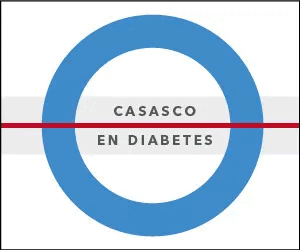People with diabetes: adherence to treatment, quality of life and education
DOI:
https://doi.org/10.47196/diab.v53i3.157Keywords:
diabetes, quality of life, preventable chronic complicationsAbstract
The evidence available in the literature shows that the quality of care of people with diabetes, both nationally and internationally, is far from ideal1-3, which determines the development and progression of chronic preventable complications of the disease. This results in an increase in the costs of their care and a decrease in the quality of life of those who suffer from it4.
Achieving an effective change in this situation implies, among other objectives, identifying the underlying causes that determine it. In this sense, in diabetes and the associated risk factors, like all chronic diseases, the quality of care depends largely on the effective interaction between the doctor and the patient, that is, on a correct diagnosis and appropriate prescription, in addition of a correct implementation of it.
References
Reach G, Pechtner V, Gentilella R, Corcos A, Ceriello A. Clinical inertia and its impact on treatment intensification in people with type 2 diabetes mellitus. Diabetes Metab 2017; 43:501
Tabesh M, Magliano DJ, Tanamas SK, Surmont F, Bahendeka S, Chiang CE, Elgart JF, Gagliardino JJ, Kalra S, Krishnamoorthy S, Luk A, Maegawa H, Motala AA, Pirie F, Ramachandran A, Tayeb K, Vikulova O, Wong J, Shaw JE. Diabetes management and treatment approaches outside of North America and West Europe in 2006 and 2015. Acta Diabetol 2019; 56:889
Gagliardino JJ, Elgart JF, Forti L, Querzoli I, Chantelot JC. Type 2 diabetes: Prescription patterns and treatment outcomes of IDMPS survey in Argentina. Diabetes Res Clin Pract 2019; 153:86
Elgart JF, Asteazarán S, De La Fuente JL, Camillucci C, Brown JB, Gagliardino JJ. Direct and indirect costs associated to type 2 diabetes and its complications measured in a social security institution of Argentina. Int J Public Health 2014; 59:851un gran esfuerzo, quizás debamos recurrir como estímulo a una vieja frase de Elliot P. Joslin que hace varios años sabiamente planteó: “El diabético que más sabe, vive más y mejor tiempo”8.
Juan José Gagliardino
Investigador Superior del CONICET,
Centro de Endocrinología Experimental
y Aplicada (CENEXA),
Facultad de Ciencias Médicas,
Universidad Nacional de La Plata
Mogre V, Johnson NA, Tzelepis F, Shaw J, Paul C. Adherence to self-care behaviours and associated barriers in type 2 diabetes patients of low-and middle-income countries: a systematic review protocol. Syst Rev 2017; 6:39.
Assal JP. Revisiting the approach to treatment of long-term illness: from the acute to the chronic state. A need for educational and managerial skills for long-term follow-up. Patient Educ Couns 1999; 37:99 (Review).
Loskutova NY, Tsai AG, Callen E, Ajayi K, Carroll JK, Harrington M, Turner TJ, Pace WD. Differences in perspectives regarding diabetes management between health care providers and patients. Transl Behav Med 2018; 8:328
Barnett D, Joslin EP. A centennial portrait. Joslin Diabetes Center 1999.
Downloads
Published
How to Cite
Issue
Section
License

This work is licensed under a Creative Commons Attribution-NonCommercial-NoDerivatives 4.0 International License.
Dirección Nacional de Derecho de Autor, Exp. N° 5.333.129. Instituto Nacional de la Propiedad Industrial, Marca «Revista de la Sociedad Argentina de Diabetes - Asociación Civil» N° de concesión 2.605.405 y N° de disposición 1.404/13.
La Revista de la SAD está licenciada bajo Licencia Creative Commons Atribución – No Comercial – Sin Obra Derivada 4.0 Internacional.
Por otra parte, la Revista SAD permite que los autores mantengan los derechos de autor sin restricciones.







































